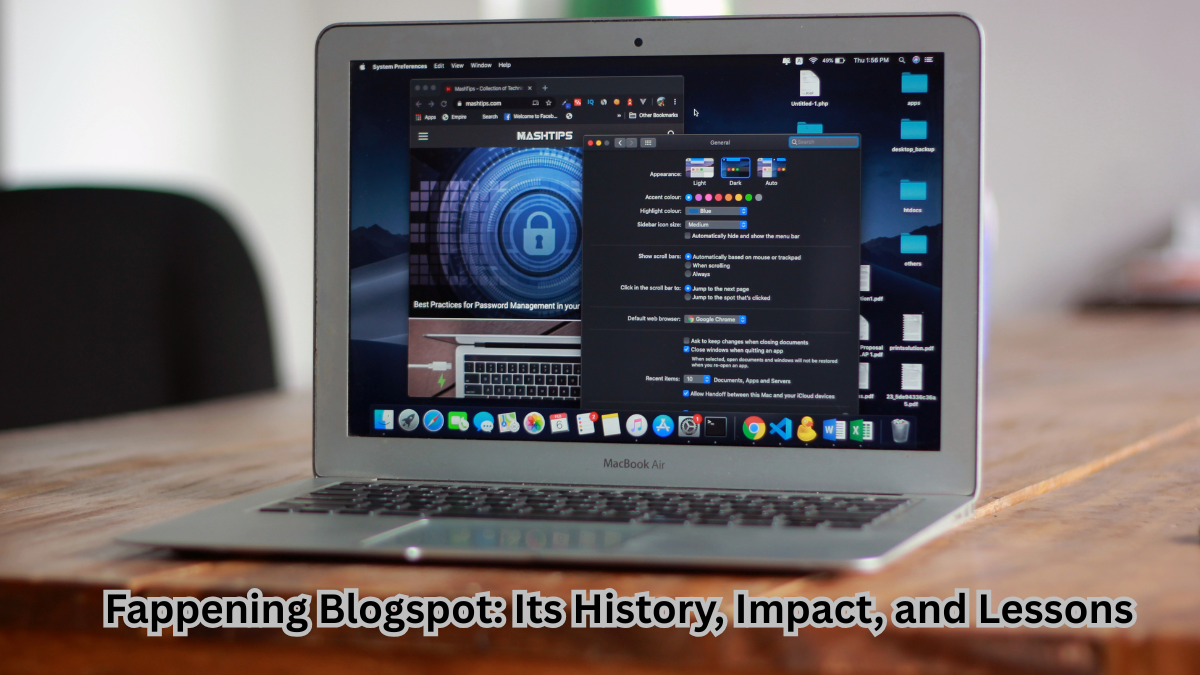The phrase “Fappening Blogspot” refers to websites and online discussions that emerged in the aftermath of one of the most notorious internet privacy scandals of the last decade. The Fappening—an informal name given to a series of celebrity photo leaks in 2014—sparked debates about online security, digital ethics, and the vulnerabilities of cloud-based technology. Blogspot, as one of the easiest platforms for bloggers to use, became a hub for individuals who either documented the leaks, commented on the event, or criticized the wider implications. To understand this term, it is important to look not only at what happened but also why it mattered, how it changed the internet, and what it still teaches us today.
What Was the Fappening Blogspot?
The term “Fappening” combined two words: “fap,” an internet slang term for male self-pleasure, and “happening,” to describe the viral spread of leaked material. It referred to the 2014 release of private, often intimate, photographs of several high-profile celebrities, including actors, models, and athletes. The incident was not merely about gossip or tabloid interest—it highlighted the vulnerabilities of cloud-based storage systems, the ethics of digital consumption, and the speed at which private content could spread across the internet.
Why Fappening Blogspot Became Part of the Story
Blogspot, owned by Google, was among the most popular free blogging platforms at the time. Users could quickly create blogs without technical expertise. When the Fappening occurred, some individuals used Blogspot to:
- Aggregate leaked images (often taken down shortly after by Google).
- Write commentaries or amateur analyses on cybersecurity and hacking.
- Debate the moral, cultural, and legal implications of the scandal.
While many of these blogs were eventually removed for violating terms of service, the connection between “Fappening” and “Blogspot” became a notable part of the incident’s digital history.
The Timeline of Events Fappening Blogspot
Understanding the Fappening Blogspot requires tracing the chronology:
- August 2014: Leaked images began surfacing on message boards such as 4chan and Reddit.
- September 2014: Media outlets reported the breach widely, naming it “The Fappening.”
- Late 2014: Blogspot pages started popping up, some hosting content, others serving as spaces for opinion.
- 2015–2016: Law enforcement investigations identified and prosecuted hackers responsible for accessing celebrity iCloud accounts.
- Aftermath: Blogspot’s role diminished as major tech companies tightened policies, but the term remained a marker of that period.
A Digital Turning Point
The Fappening marked a turning point in public awareness of cybersecurity. Before 2014, many users trusted cloud services with sensitive data without fully understanding the risks. After the incident, companies such as Apple and Google implemented stronger encryption, multi-factor authentication, and user education campaigns.
Celebrities, who once assumed their private photos were secure in personal devices or cloud backups, became vocal about digital safety. The broader public began asking: If this can happen to public figures, what about ordinary people?
Blogspot’s Role as an Archive and Forum
Unlike forums such as Reddit, which operated with large communities, Blogspot allowed for more personal, journal-like entries. Some blog authors wrote reflective essays about internet culture, victim-blaming, and the role of media. Others unfortunately sought traffic by posting or linking to illicit material, often removed quickly by Google’s moderation systems.
This duality—informative commentary versus exploitation—made Blogspot a unique digital mirror of society’s divided response. It also raised important questions about free expression versus harmful distribution of stolen content.
Table: Blogspot’s Role in the Fappening Context
| Aspect | Positive Use | Negative Use | Long-Term Effect |
|---|---|---|---|
| Commentary | Essays exploring digital ethics | Justifications of hacking | Raised awareness of cybersecurity |
| Archiving | Saving news articles for reference | Hosting leaked photos | Forced stricter moderation policies |
| Community | Discussions on privacy laws | Encouraging voyeurism | Sparked legal debates on online speech |
| Education | Cybersecurity tips shared | Misleading claims about hacking methods | Improved tech literacy among some readers |
The Cultural Fallout
The scandal was not just technological—it was cultural. The Fappening exposed the public’s fascination with celebrity lives and the blurred line between public curiosity and exploitation. Blogspot amplified this cultural divide. Some writers condemned the leaks, framing them as a violation of dignity and digital rights. Others sensationalized the event, treating it as entertainment.
For media scholars, Blogspot posts from this period serve as primary sources reflecting how internet culture processed the event.
Lessons Learned
- No Cloud Service Is Invulnerable
The incident revealed that even industry giants could not guarantee absolute safety. - Digital Literacy Is Crucial
Many users were unaware of weak passwords, phishing schemes, or the dangers of reusing login details. - Ethics of Viewing Matter
Blogspot discussions highlighted an important question: was merely viewing leaked photos an act of complicity? - Platforms Have Responsibilities
Google’s removal of violating blogs set a precedent for how platforms must act in crises. - Society’s Fascination with Privacy Breaches Persists
The Fappening was not an isolated event; similar leaks have occurred since, though rarely on the same scale.
The Human Side of the Story
While technological lessons are essential, the human dimension cannot be ignored. Victims of the leaks described feelings of humiliation, betrayal, and loss of control. Blogspot posts from the time often failed to capture this emotional depth, focusing instead on the scandal’s spectacle. With hindsight, one can see that empathy and respect for victims were the missing elements in much of the online discourse.
The Legal Dimension
The U.S. Department of Justice prosecuted several individuals involved in the hacking, leading to prison sentences. Blogspot, while not directly complicit, was one of the many platforms forced to adapt its policies. These cases set legal precedents around unauthorized computer access and digital privacy violations.
How the Fappening Blogspot Era Shaped Online Behavior
Today, users are more cautious about digital footprints. Influencers, celebrities, and ordinary people alike often keep sensitive data offline or use stronger security tools. Blogspot itself has shifted from being a casual hub of raw internet culture to a quieter corner of the web, overshadowed by social media platforms like Twitter (now X), Instagram, and TikTok.
Yet the lessons remain: what happened once can happen again.
Broader Implications for Internet Culture
- The Speed of Viral Spread: The scandal showed how quickly private information could circle the globe.
- Ethics of Consumption: Even those who didn’t share the photos but looked at them contributed to the scale of harm.
- Responsibility of Platforms: Moderation and content removal became central debates in the following years.
Moving Beyond the Scandal
Today, when people search for “Fappening Blogspot,” they are less likely looking for illicit material and more often seeking to understand history. It has become a case study in universities, technology think tanks, and digital ethics forums. The scandal is now less about sensationalism and more about how society negotiates privacy in a connected world.
Conclusion
The Fappening Blogspot is not just a keyword or an old scandal—it is a reminder of the fragility of privacy in the digital era. By examining its history, impact, and lessons, we gain insights into the balance between technology, culture, and human dignity. The blogs that once sprang up around this event, whether exploitative or thoughtful, remain part of the internet’s complex archive. For readers today, the key takeaway is simple: digital safety is not optional, empathy matters, and history has a way of repeating itself if we do not learn from it.
FAQs
1. What does “Fappening Blogspot” mean?
It refers to blogs on the Blogspot platform that emerged during the 2014 Fappening scandal, often hosting discussions, commentary, or in some cases, leaked images.
2. Why was Blogspot significant during the Fappening?
Because it allowed users to easily create blogs, some of which became spaces for debate, news archiving, or unfortunately, hosting stolen content.
3. What lessons did the Fappening teach about cybersecurity?
It emphasized the importance of strong passwords, two-factor authentication, and understanding the risks of cloud storage.
4. Were the Fappening Blogspot pages legal?
Most were shut down for violating Google’s policies. Hosting stolen intimate images without consent was illegal and unethical.
5. How is the Fappening remembered today?
It is remembered as both a major privacy violation and a turning point in public awareness of digital security.











